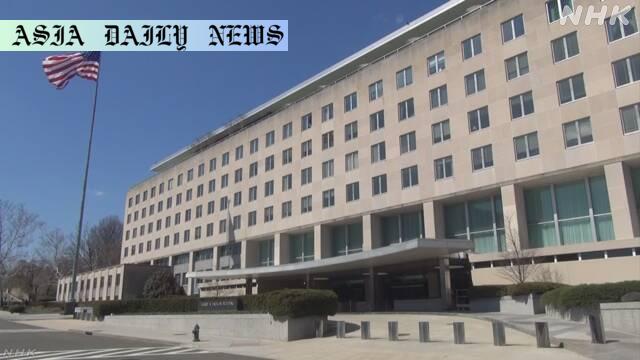Caution: The US State Department urges Americans abroad to exercise vigilance amid rising tensions and potential threats.
The US State Department has issued a Worldwide Caution Security Alert.
The advisory warns Americans overseas to exercise increased vigilance.
Potential threats include protests, cyberattacks, and travel disruptions.
Rising tensions between Israel and Iran are contributing factors.
Homeland Security noted risks of violence against US targets due to escalation.

Introduction: Why Vigilance is Crucial Right Now
The United States State Department has issued a Worldwide Caution alert, urging Americans across the globe to exercise increased vigilance. This advisory comes amidst escalating tensions in the Middle East, specifically due to the ongoing conflict between Israel and Iran. The alert seeks to prepare American citizens for potential threats, ranging from protests targeting the US to disruptions in travel and even cyberattacks. This heightened alert reflects the critical need to stay informed and cautious in an increasingly unstable global environment.
Details of the Worldwide Alert
The Worldwide Caution Security Alert issued on Sunday highlights key areas of concern for American citizens abroad. Most notably, it mentions the possibility of disruptions to travel and airspace closures in the Middle East—a direct consequence of the conflict between Israel and Iran. Additionally, the warning also touches upon the potential for demonstrations that may target US citizens and interests in various parts of the world. These risks are compounded by the volatile political climate, which shows no signs of cooling down soon.
Cybersecurity Concerns from Homeland Security
In addition to the general caution for physical threats abroad, the Department of Homeland Security has raised alarm about possible cyberattacks. Pro-Iranian hackers might target US networks, aiming to cause widespread disruption and financial harm. This advisory also underlines the risk of homegrown extremism, particularly individuals who may be spurred into action if Iran’s leadership calls for retaliatory violence. This dual threat—both digital and physical—accentuates the importance of vigilance on multiple fronts.
Travel Warnings and Mobility
For Americans traveling abroad, the alert points to specific challenges that may arise. Travelers should expect periodic airspace closures and delays, especially in regions proximal to the Middle East. The conflict between Israel and Iran, while localized in region, has global ramifications for travel and mobility. Whether planning a short vacation or a long-term relocation, individuals must exercise caution and stay updated with the latest advisories to ensure their safety.
Preparedness and Staying Informed
American citizens are encouraged to register with the nearest US embassy or consulate while traveling to help stay informed about local security issues. Using resources such as the State Department’s Smart Traveler Enrollment Program (STEP) can provide individuals with real-time updates that may help mitigate risks. Additionally, staying alert to local news, as well as diversifying modes of communication, will be critical during this uncertain time.
Global Implications and Moving Forward
While the US State Department’s alert focuses on the immediate threats to its citizens, the underlying issues have far-reaching global implications. The growing hostility in the Middle East could lead to long-lasting disruptions in global trade, travel, and international relations. As tensions between nations escalate, it becomes more critical than ever for people and governments alike to prioritize safety and deterrence. Ultimately, vigilance and preparedness will prove to be vital tools in navigating this turbulent period.
Commentary
Understanding the Urgency of the Worldwide Caution Alert
As global citizens, it is vital to acknowledge the weight of the US State Department’s Worldwide Caution Security Alert. This is not just a routine advisory but a reflection of mounting global instability, particularly in regions heavily impacted by geopolitical conflicts. The Middle East’s ongoing tension between Israel and Iran has a ripple effect on international safety, mobility, and cybersecurity. Such advisories should be seen as a call to action for individuals to stay informed and strategic about their movements.
The Role of Technology in Addressing Threats
One of the significant aspects of this alert is the focus on cybersecurity threats. In an increasingly interconnected world, cyberattacks can have devastating consequences—not just for governments and corporations but also for individuals who may fall victim to identity theft or data breaches. The emphasis on potential hacking attempts should prompt citizens and organizations to evaluate their security protocols, enhancing the layers of protection surrounding their digital assets. Staying one step ahead in the cybersecurity realm is no longer optional but a necessity.
Steps to Mitigate Risks
For those traveling abroad or residing in potentially high-risk areas, preparation is a cornerstone of safety. This includes having a contingency plan in place, such as knowing the location of the nearest embassy, maintaining emergency contact numbers, and keeping backup funds accessible. Investing in travel insurance and ensuring there is a reliable line of communication with family or friends can provide additional layers of security. Furthermore, practicing vigilance by avoiding large gatherings or political demonstrations is a simple yet effective way to minimize personal risk in unstable environments.
Conclusion: A Call for Global Awareness
The Worldwide Caution Security Alert serves as a reminder of how interconnected our world has become. Conflicts occurring thousands of miles away can impact us in unexpected ways, whether through travel disruptions, cybersecurity breaches, or political demonstrations. It is essential to cultivate a mindset of global awareness, understanding that safety is a dynamic concept requiring adaptability and responsibility. As individuals and communities, we must respond proactively to these challenges, ensuring the security and well-being of ourselves and those around us.


